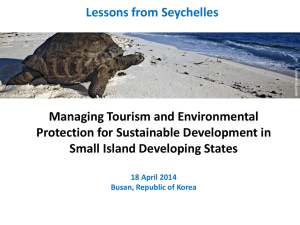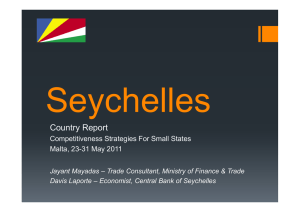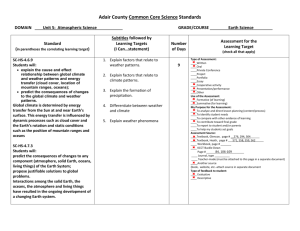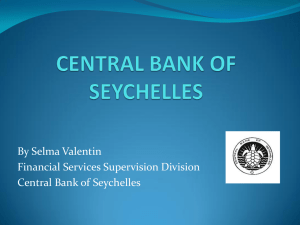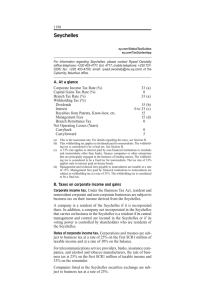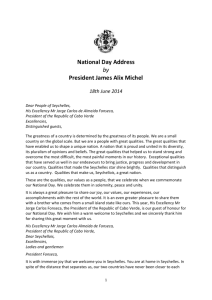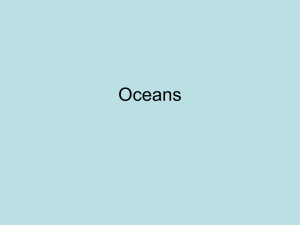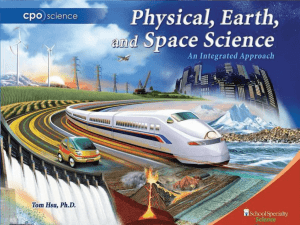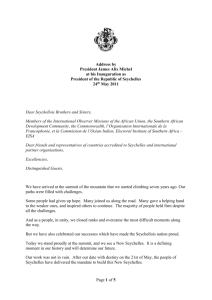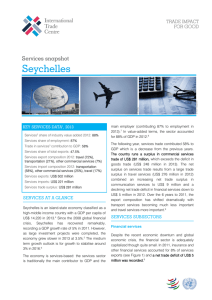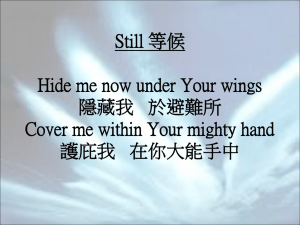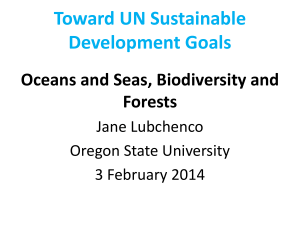Min. Natural Resource Mr. P Sinon- BE speech
advertisement
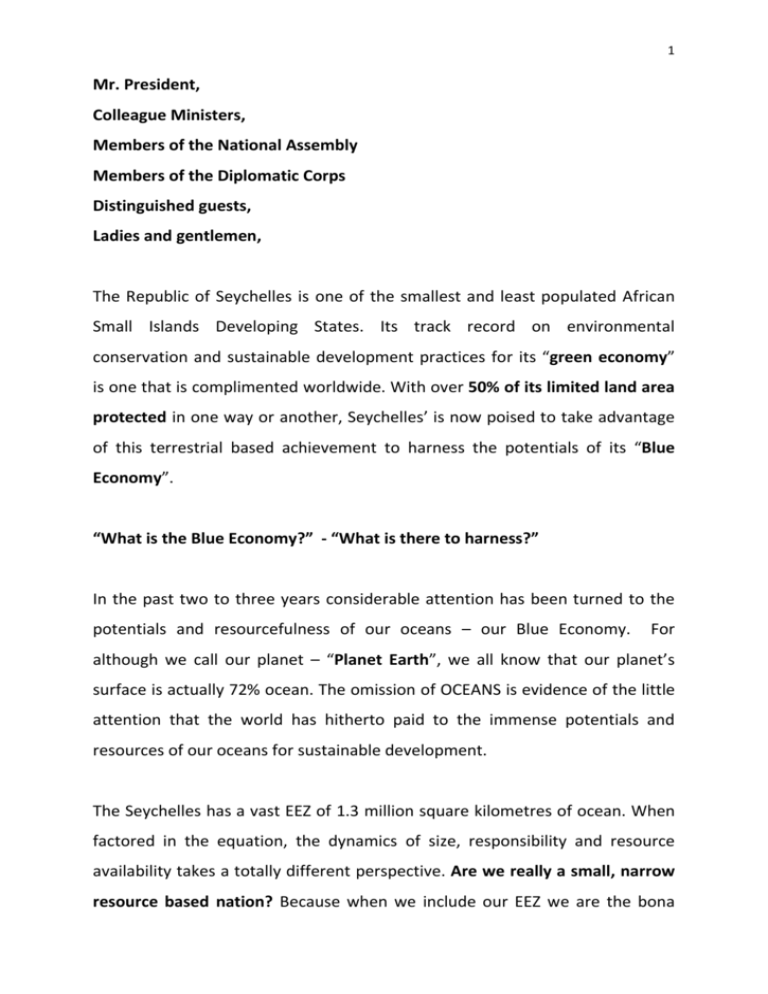
1 Mr. President, Colleague Ministers, Members of the National Assembly Members of the Diplomatic Corps Distinguished guests, Ladies and gentlemen, The Republic of Seychelles is one of the smallest and least populated African Small Islands Developing States. Its track record on environmental conservation and sustainable development practices for its “green economy” is one that is complimented worldwide. With over 50% of its limited land area protected in one way or another, Seychelles’ is now poised to take advantage of this terrestrial based achievement to harness the potentials of its “Blue Economy”. “What is the Blue Economy?” - “What is there to harness?” In the past two to three years considerable attention has been turned to the potentials and resourcefulness of our oceans – our Blue Economy. For although we call our planet – “Planet Earth”, we all know that our planet’s surface is actually 72% ocean. The omission of OCEANS is evidence of the little attention that the world has hitherto paid to the immense potentials and resources of our oceans for sustainable development. The Seychelles has a vast EEZ of 1.3 million square kilometres of ocean. When factored in the equation, the dynamics of size, responsibility and resource availability takes a totally different perspective. Are we really a small, narrow resource based nation? Because when we include our EEZ we are the bona 2 fide custodians of a geographical area that is stated to be 3 times the size of France. I ask again – Are we really a small nation with limited resources or does the dynamic really change when we look at it from an angle that includes our EEZ as part and parcel of our development platform? I will leave this as food for thought for your further discussion. At the Rio+20 the “Blue Economy concept”, was forced onto the agenda as a developing world initiative pioneered by SIDS. The Blue Economy approach that Seychelles is promoting is one that is anchored on the principles of ‘sustainable development’. This approach also underlies the 2012 United Nation Environmental Programme report entitled the “Green Economy in a Blue World”. Under the unwavering leadership of President Michel we have spared no effort to endorse and promote the Blue Economy concept on the national, regional and international platforms. Our efforts have contributed significantly to giving the concept the international credibility that it currently enjoys. The first Summit on the subject, was part of Abu Dhabi’s Annual Sustainability Conference in January 2014. It was led by President Michel and sent a clear message of the intentions of the Republic of Seychelles. It is evident that for Seychelles, the Blue Economy concept and the principles of Sustainable Development are inextricably linked. In our region both island states and coastal states have been involved in various aspects of the Blue Economic concept. Some have barely stepped into the ocean whilst others have developed commendable expertise in certain areas. 3 The Republic of Seychelles has certainly not missed some of the opportunities in the following: i) Fisheries: One of the highest per capital consumers of wild fresh finfish on the planet, Seychelles has emerged as the hub for landing and transhipping the Blue Gold (Tuna). ii) In nurturing this industry and others we faced the scourge of piracy and have developed capabilities as well as forged partnerships that have made the our oceanic grounds safer. iii) Port Victoria is host to the largest Tuna canning factory in the region, producing millions of cans of tuna per day. iv) Port Victoria also boasts the deepest and safest port in the Indian Ocean for all maritime operations. With Seychelles lying outside the cyclone belt the Victoria Commercial and Fishing Ports have the ability to operate 365 days a year, 24/7. v) Zone 14 is the natural extension of our industrial Blue Gold (Tuna) industrial fishing sub-sector. The capacity and role of Port Victoria is being increased with the recent addition of a 120-metre quay. This will soon be complimented by the addition of a 425-metre quay under a public-private sector partnership. vi) Unprecedented growth in the semi-industrial fisheries sub-sector has prompted the Government to start negotiations with our Japanese partners to extend the Providence semi-industrial port and related facilities. This sub-sector has lately benefited from processing plants in which they can add-value to the catch. vii) Bunkering and other related services out of Port Victoria is very lucrative and SEYPEC has gone further with the purchase of 5 oil tankers that ply the world’s oceans building young Seychellois capacity and delivering or taking on fuel for distribution. 4 viii) Hydrocarbons have recently been discovered mainly offshore, on the East African Coasts of Mozambique, Tanzania and Kenya. Seychelles is also exploring for offshore oil – the signs are encouraging. ix) The potentials of the resources in the oceans offer many new avenues for business. Seaweed transformation into useable fertilizer is a project by a Seychellois entrepreneur that is already being considered for implementation. x) To properly and sustainably manage the opportunities of the Blue Economy – we need to increase our knowledge of our Maritime space. Thus a maritime spatial planning of our EEZ is a crucial starting point. This exercise is already being implemented which will ensure we avoid future conflicts in use of our maritime space and resources. xi) The potentials of aquaculture and mariculture are encouraging. A comprehensive “Mariculture Master Plan” (MMP -2015-2020) is being finalized. It will be complete in the first quarter of 2015. Government has decided to start implementation of only 5 % of the identified potentials. This refers to the additional production capacity of 50,000 tonnes of fish per annum translating to new export revenues of approximately 250 million US$ and the creation of 2,000 new jobs. xii) Our idyllic, pristine beaches and turquoise blue sea attracts tourists and we should tirelessly treasure these as important pillars for our tourism economy. The spin-offs from tourism bring critical revenues and jobs that we can ill afford to take for granted. 5 xiii) And finally, the virtues of reclamation have positively transformed and opened up opportunities with projects such as the International airport, the ports, the Eden Island project, Perseverance Housing projects and others. Seychelles has literally been opened-up to the world and vice-versa on the platform of the “Blue Economy”. From there, tourism and fisheries, the first and second pillars of our economy, have prospered. Mr. President: With your devoted leadership in this quest, Seychelles is on the road to offer the region and the world the prospect of sustained, environmentally sound and socially inclusive economic growth of our Blue Economy. We aim to take optimal advantage of the strengths of our coastal and marine sectors. As we move forward, the implementation of the concept will reverse the current trends of continuous degradation of the marine ecosystem and its functionalities. There is a lot of work to be done. We have to establish complimentary rules and regulations and change mind-sets. They have to be replaced by concrete actions that will promote sustainable management of our ocean space and its potentials. Distinguish Guests – Ladies and Gentlemen, The oceans are living entities– they are not Dead Seas – yet we have the capacities to kill our oceans and in the process kill a very import part of ourselves! The complex ecosystem that we have to get to know, to manage and respect as we harness the opportunities of our Blue Economy are daunting tasks that will stretch our abilities. We are nevertheless committed to face the 6 challenges and continue to lead in the quest to further harness and valorize the potentials of our common oceans. Multiple conferences, symposiums, fora, summits, have been conducted on the subject matter. So far there has been two World Oceans Summits the third is in the making. The FAO has come out with the Blue Growth Initiative, the United States hosted an Oceans Conference that I personally had the honour to address, the African Union has come out with its “Africa Integrated Maritime Strategy” (AIMS) whilst the United Nations Economic Commission for Africa (UNECA) have commissioned a report entitled “Unlocking the full potential of the blue economy”: and asks the question: “Are African Small Island Developing States ready to embrace the opportunities?” Mr. President, Distinguished guest, ladies and gentlemen We are gathered for the one and a half day forum to partly answer this Question! Are we – Seychelles – ready to embrace the opportunities offered by our Blue Economy!! In wishing you fruitful deliberations that will I am sure be an input in the second Seychelles Blue Economy Summit in January 2015 at the Sustainability Conference in Abu Dhabi. THANK YOU ALL FOR YOUR ATTENTION. Thank you.
